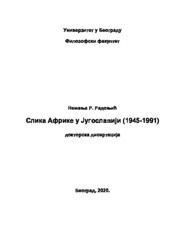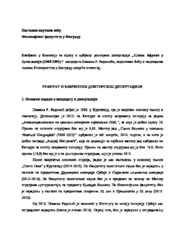Слика Африке у Југославији: (1945-1991)
Image of Africa in Yugoslavia: (1945-1991)
| dc.contributor.advisor | Vučetić, Radina | |
| dc.contributor.other | Ristović, Milan | |
| dc.contributor.other | Bogetić, Dragan | |
| dc.contributor.other | Manojlović-Pintar, Olga | |
| dc.creator | Radonjić, Nemanja | |
| dc.date.accessioned | 2021-02-01T14:15:57Z | |
| dc.date.available | 2021-02-01T14:15:57Z | |
| dc.date.issued | 2020-11-26 | |
| dc.identifier.uri | http://eteze.bg.ac.rs/application/showtheses?thesesId=7853 | |
| dc.identifier.uri | https://fedorabg.bg.ac.rs/fedora/get/o:23147/bdef:Content/download | |
| dc.identifier.uri | http://vbs.rs/scripts/cobiss?command=DISPLAY&base=70036&RID=26569993 | |
| dc.identifier.uri | https://nardus.mpn.gov.rs/handle/123456789/17768 | |
| dc.description.abstract | У тези се обрађује феномен имагинарне географије пост-колонијалне Африке у социјалистичкој, несврстаној Југославији. Користећи изворе похрањене у архивима, штампу, путописе, публицистику, друштвене науке, фотографију, филм и усмене интервјуе, испитује се слика Другог у односу на афричке земље, народе и појединце. Користећи методологију имагологије и постколонијалних студија издвајају се и анализирају слике створене на полу-колективном нивоу код четири дела југословенског друштва – политичке елите, стручњака, културне елите и обичних људи. У раду се доказује да је Африка имала специфично и важно место у југословенској слици света, пре свега захваљујући политици несврстаности и друштвеној клими коју је она створила за прихватање Другог. У раду се одбацују симплификована објашњења о југословенској потрази за статусом у Африци и крипто колонијализму, и подвлачи се дискурс солидарности, антиколонијализма и антирасизма. На стварање слике Африке највише је утицала политичка елита Југославије, која је задала главне оквире репрезентације континента, нарочито у односу на кључне феномене колонијализма, расизма и пост-колонијалног стања. Стручњаци, који су махом одлазили на рад у Африку, учествовали су у процесу африканизације, развоја али и социјалистичке модернизације у афричким државама, а њихови извештаји са терена показали су широк распон слика којима је заједнички биo социоцентризам, односно вера у могућност и потребу Африканаца да се национално еманципују и трансформишу из колонијалних поданика у борце, раднике, сељаке, студенте. Културна елита одиграла је важну улогу у сузбијању стереотипа о Африци, и посредовала је у упознавању афричких култура у Југославији. Код обичних људи је доминирала слика Африканца као лидера, борца и студента, подвучена дискурсом солидарности | sr |
| dc.description.abstract | This thesis deals with the question of imaginary geography as it pertains to post-colonial Africa in the global imaginary of socialist, nonaligned Yugoslavia. Using archival sources, print and electronic media, social sciences, film, photography and oral history, we examine the image of the Other in relation to African lands, nations and individuals. Using the methodology of imagology and postcolonial studies we analyze images created on the semi-collective level of four groups within the Yugoslav society : political elites, experts, cultural elite and ordinary people. This thesis proves that Africa had a specific and important place in the Yugoslav image of the world, which was initiated by the politics of nonalignment and the societal relations it created for the acceptance of the African Other. We reject simplified explanations regarding Yugoslav quest for status or crypto colonialism and we emphasize the discourse of solidarity, anticolonialism and antiracism. The image of Africa in Yugoslavia was mostly shaped by the political elite, which outlined the mental map of the continent, especially regarding key phenomena of colonialism, racism and the post-colonial state. Experts were a part of the process of africanisation, development and socialist modernization in African states. Their reports showed a large assortment of images, underlined by sociocentrism which expected the African to be transformed from the colonized subjects to fighters, workers, students and peasants. Cultural elite was important in the rebuffing stereotypes about Africa via direct contact with African cultural production. Ordinary people viewed Africa through the lens of solidarity, which fortified the images of the African as a fighter, leader and student | en |
| dc.format | application/pdf | |
| dc.language | sr | |
| dc.publisher | Универзитет у Београду, Филозофски факултет | sr |
| dc.rights | openAccess | en |
| dc.rights.uri | https://creativecommons.org/licenses/by-nc-nd/4.0/ | |
| dc.source | Универзитет у Београду | sr |
| dc.subject | Југославија | sr |
| dc.subject | Yugoslavia | en |
| dc.subject | Africa | en |
| dc.subject | nonalignment | en |
| dc.subject | imagology | en |
| dc.subject | image of the Other | en |
| dc.subject | Cold war | en |
| dc.subject | anticolonialism | en |
| dc.subject | postcolonialism | en |
| dc.subject | socialism | en |
| dc.subject | antiracism | en |
| dc.subject | Африка | sr |
| dc.subject | несврстаност | sr |
| dc.subject | имагологија | sr |
| dc.subject | слика Другог | sr |
| dc.subject | хладни рат | sr |
| dc.subject | антиколонијализам,постколонијализам | sr |
| dc.subject | социјализам | sr |
| dc.subject | антирасизам | sr |
| dc.title | Слика Африке у Југославији: (1945-1991) | sr |
| dc.title.alternative | Image of Africa in Yugoslavia: (1945-1991) | en |
| dc.type | doctoralThesis | en |
| dc.rights.license | BY-NC-ND | |
| dcterms.abstract | Вучетић, Радина; Ристовић, Милан; Манојловић-Пинтар, Олга; Богетић, Драган; Радоњић, Немања; Slika Afrike u Jugoslaviji: (1945-1991); | |
| dc.identifier.fulltext | https://nardus.mpn.gov.rs/bitstream/id/67828/Disertacija.pdf | |
| dc.identifier.fulltext | https://nardus.mpn.gov.rs/bitstream/id/67829/IzvestajKomisije23567.pdf | |
| dc.identifier.rcub | https://hdl.handle.net/21.15107/rcub_nardus_17768 |



